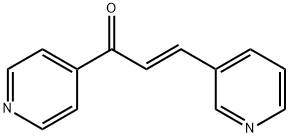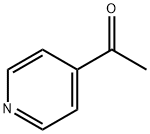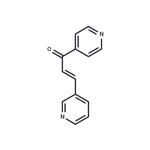Description
3PO (18550-98-6) is an inhibitor of the metabolic enzyme 6-Phosphofructo-2-kinase/fructose-2,6-bisphosphatase 3 (PFKFB3).? PFKFB3 is constitutively expressed by neoplastic cells and is required for the high glycolytic rate (Warburg Effect) of these cells. 3PO inhibits PFKFB3 (IC50?= 1.4 – 24 μM for various cancer cell lines), suppresses glucose uptake, and lowers intracellular concentrations of Fru-2,6-BP, lactate, ATP, NAD+, and NADH.1? Inhibition of cancer cell metabolism via blocking the action of PFKFB3 has been studied in various models.2-4? Inhibition of PFKFB3 has been shown to induce autophagy as a survival mechanism in cancer cells.5? 3PO has also been used to reduce pathological angiogenesis.6
Uses
3PO is an inhibitor of PFKFB3. 3PO attenuates the proliferation of several cancer cell lines with IC50s of 1.4-24 μmol/L. 3PO suppresses glucose uptake and decreases the intracellular concentration of Fru-2,6-BP, lactate, ATP, NAD+ and NADH. 3PO can be used for the research of cancer[1].
Definition
ChEBI: 3PO is a member of the class of pyridines that is pyridine substituted by a 3-oxo-3-(pyridin-4-yl)prop-1-en-1-yl group at position 3. An inhibitor of PFKFB3 kinase, an enzyme with a key role in glycolysis. It has a role as an antineoplastic agent, an angiogenesis inhibitor, an autophagy inducer, an apoptosis inducer and an EC 2.7.1.105 (6-phosphofructo-2-kinase) inhibitor. It is a member of pyridines and an enone.
Biochem/physiol Actions
3PO is a potent and selective inhibitor of PFKFB3 (6-Phosphofructo-2-kinase/fructose-2,6-bisphosphatase) that reduces glycolytic flux and suppresses glucose uptake. 3PO is selectively cytostatic to transformed cells and suppresses the growth of established tumor in mice.
in vivo
3PO (0.07 mg/g; i.p. once per day for 14 days) inhibits the growth of Lewis lung carcinoma xenografts in C57Bl/6 mice[1].
3PO (0.07 mg/g; i.p. three sequential daily injections followed by 3 off days for 14 days) inhibits the tumor growth in BALB/c athymic mice[1].
3PO (0.07 mg/g; i.p. two daily injections followed a 7-day rest for 14 days) inhibits the tumor growth in BALB/c athymic mice[1].
3PO (0.07 mg/g; i.p. once) inhibits Fru-2,6-BP and glucose uptake in C57Bl/6 mice[1].
| Animal Model: | Female C57Bl/6 mice with Lewis lung carcinoma xenografts[1] |
| Dosage: | 0.07 mg/g |
| Administration: | Intraperitoneal injection; 0.07 mg/g once a day; for 14 days |
| Result: | Suppressed the growth of Lewis lung carcinoma xenografts in C57Bl/6 mice compared to the control group. |
| Animal Model: | Female BALB/c athymic mice with MDA-MB231 human breast adenocarcinoma xenografts[1] |
| Dosage: | 0.07 mg/g |
| Administration: | Intraperitoneal injection; 0.07 mg/g three sequential daily injections of either DMSO or 3PO followed by 3 off days; for 14 days |
| Result: | Suppressed xenograft tumorigenic growth of MDA-MB231 cells compared with the controls. |
| Animal Model: | Female BALB/c athymic mice with HL-60 leukemia xenografts[1] |
| Dosage: | 0.07 mg/g |
| Administration: | Intraperitoneal injection; 0.07 mg/g two daily injections followed a 7-day rest; for 14 days |
| Result: | Suppressed xenograft tumorigenic growth of HL-60 leukemia compared with the controls, especially from the second administration cycle. |
| Animal Model: | Female C57Bl/6 mice with Lewis lung carcinoma xenografts[1] |
| Dosage: | 0.07 mg/g |
| Administration: | Intraperitoneal injection; once |
| Result: | Decreased Fru-2,6-BP and glucose uptake in C57Bl/6 mice compared to control group. |
References
1) Clem?et al.?(2008),?Small-molecule inhibition of 6-phosphofructo-2-kinase activity suppresses glycolytic flux and tumor growth; Mol. Cancer Ther.?7?110
2) Clem?et al.?(2013),?Targeting 6-phosphofructo-2-kinase (PFKFB3) as a therapeutic strategy against cancer; Mol. Cancer Ther.?12?1461
3) Lea?et al.?(2015),?Inhibition of Growth of Bladder Cancer Cells by 3-(3-Pyridinyl)-1-(4-pyridinyl)-2-propen-1-one in Combination with Other Compounds Affecting Glucose Metabolism; Anticancer Res.?35?5889
4) Lea?et al.?(2016),?Inhibition of Growth by Combined Treatment with Inhibitors of Lactate Dehydrogenase and either Phenformin or Inhibitors of 6-Phosphofructo-2-kinase/Fructose-2,6-bisphosphatae 3; Anticancer Res.?36?1479
5) Klarer?et al.?(2014),?Inhibition of 6-phosphofructo-2-kinase (PFKFB3) induces autophagy as a survival mechanism; Cancer Metab.?2?2
6) Schoors?et al.?(2014),?Partial and transient reduction of glycolysis by PFKFB3 blockade reduces pathological angiogenesis; Cell Metab.?19?37










